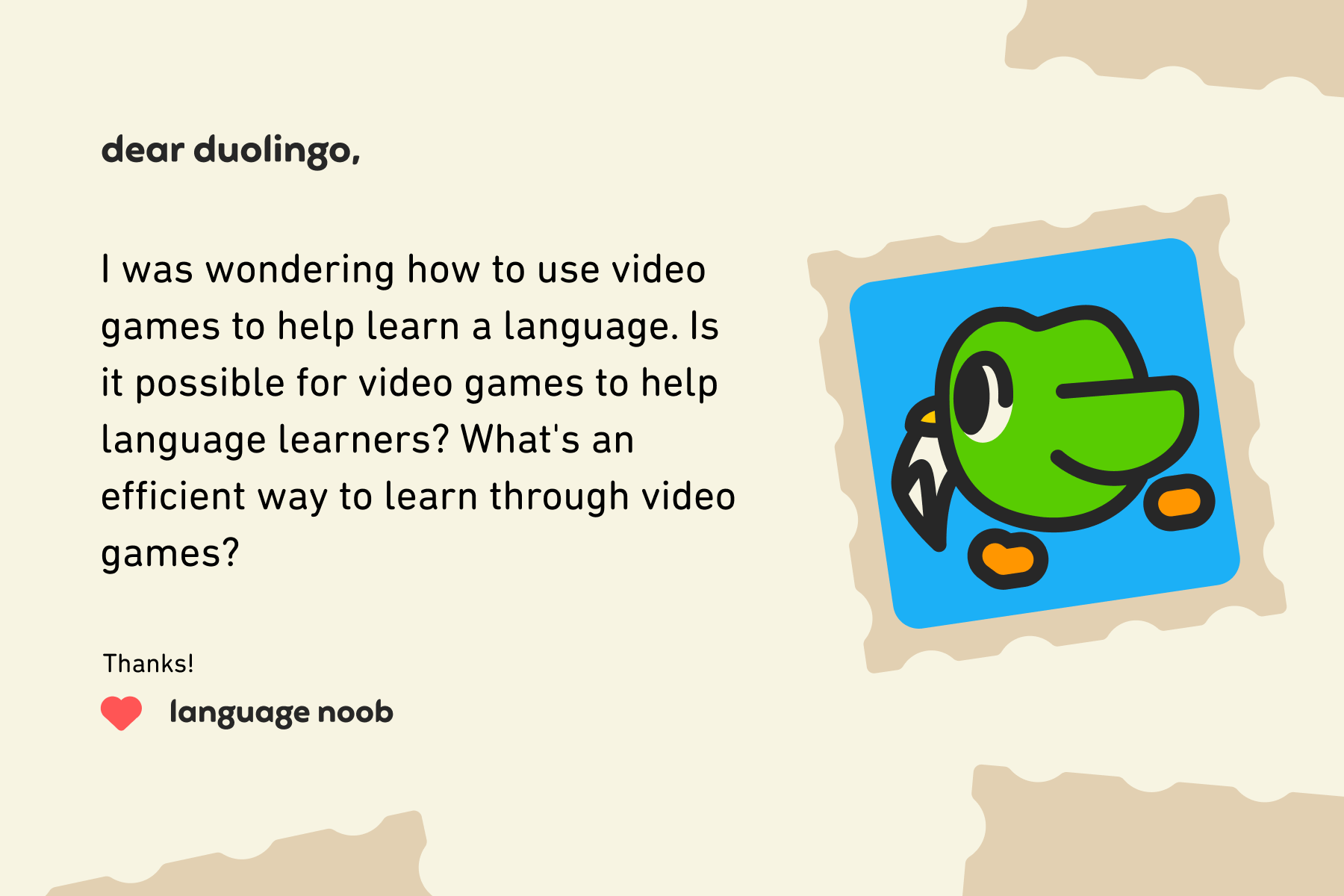Welcome to another week of Dear Duolingo, an advice column just for language learners. Catch up on past installments here.
Hi there, learners! This week, Dear Duolingo is a team effort—which is appropriate given this week's question! We're Dr. Kristina Schoen, who you might remember from posts on grammatical gender and possessive pronouns in German, and Dr. Rich Forest, Duolingo Learning and Curriculum Manager.
This is Rich's first Dear Duolingo post! Before joining Duolingo, he was an associate professor of English and taught English as a second language in the U.S., Japan, and Hong Kong.
Our teaching experiences involve different languages, but that's not what we're writing about today—instead, this week, we're answering a question about another one of our passions! Let's take a look.
Our question this week:

Oh, Language Noob, we're so glad for the chance to talk about language learning with video games! 😍 In fact, we also talked to two fellow language learners and gamers at Duolingo, Karl Channell (Principal Product Designer) and Shawn Buessing (Senior Engineering Manager) to get even more recommendations to share.
Using video games to support language learning isn't just a hobby—there are whole fields of research, like CALL (Computer Assisted Language Learning) and DGBLL (Digital Game-Based Language Learning), focused on how gamers use these tools for learning (intentionally or not). Which means you might already be able to guess the answer to Language Noob's question…
Are video games good for language learning?
Absolutely! Because players are highly motivated to succeed in the game and talk with other players—whether to collaborate, compete, or gather information—players end up doing exactly what us language teachers are always encouraging: They just communicate! Players focus so much on getting their point across, in order to do something else with the information (like understand a task, avoid danger, or order a hamburger in Yakuza!). It helps that video games are controlled environments that remove some of the more intimidating variables of practicing a new language in the real world, and many learners find them more engaging and motivating than other kinds of practice because you drive learning through your own curiosity and interest. (You can read more about some of these topics in Reality is Broken by Jane McGonigal.)
We'll get to the other linguistic benefits of playing a game in the language you're studying, but there are more general skills that gamers are building that they can leverage for their language learning:
- Gamers are good at integrating lots of information. Educators call this multiliteracy—proficiency in gathering and assessing lots of kinds of information. Gamers have to learn how to pay attention to many different elements and sources of information in order to be successful!
- Gamers are good at combining and compounding skills. As gamers progress through more advanced levels and challenges, they build and practice a lot of different skills—and success means learning to use those skills together! This kind of flexibility and applying familiar skills in new ways is exactly what is required of language learners.
- Gamers are good at absorbing information. Many games, and levels within a game, start with a tutorial: a safe place for learning the mechanics and controls of the games without serious consequences. Sometimes, tutorials are embedded into the game's narrative, so players don't even realize they're learning something new!
- Gamers are good at taking on new identities. Players typically take on a persona, goal, and personality quite different from their usual ones—it's a chance to step into a whole new world (and worldview!) and learn from others in that space. Language learning also encourages us to see ourselves in new ways and in relation to new people and cultures.
Video game recommendations for language learners
To practice your new language, think about the skills you'd like to focus on—different games will help you build different skills! For example, some games use more on-screen dialogues and subtitles than others, and games vary with how much they require you to communicate with other gamers.
Here are some things to consider when choosing games to support your learning:
- How are dialogues presented? Earlier learners may want to choose games with click-through dialogues (like Pokémon), so they can read at their own pace. More advanced learners can practice listening skills with more naturalistic dialogues, which might go by fast and can't always be replayed—which is tough for learners *and* means you might miss out on important narrative information!
- Do you want to use the language for gameplay? Consider whether you want to interact with other people in the language in real time to accomplish tasks within the game (like in World of Warcraft), or whether you prefer for interaction (language practice!) to be mostly outside the game space, like for fun and to meet new people (like in Call of Duty).
- What language do you want to practice? When choosing a new game, consider the developer. Popular off-the-shelf games from big developers might have high-quality subtitles and even dubbing. For those interested in European languages (like German!), European companies are more likely to provide support in European languages. For Japanese learners, there is no shortage of Japanese role-playing games (JRPGs) to choose from. For example, Persona 5 is especially reliant on dialogue, which makes for great practice!
If you're a beginner…
Start with single-player games, so that you get comfortable using the new language on your own in the game before interacting with other players. Think of The Sims, which can be good for working on vocabulary, especially with everyday items and situations—and since the Sims don't talk, you can focus on text-based interactions that you can control! Other construction and management simulator games, like Tycoon Simulator, will also be helpful for building vocabulary. Another fun option is The Stanley Parable, which has a really quirky and mysterious narrative… and you can't lose! A narrator describes what you're doing, telling you what to do next and what you're not allowed to do, and whether you obey or not, you just keep getting more commentary.
If you're more intermediate…
Narrative games might be just what you're looking for! These will give you quite a bit of language practice since they typically provide a TON of context to all your senses, which will help you understand and reinforce more of the language. You'll find that narrative games will rely on language to varying degrees, so some will demand a lot of comprehension to fully participate in the gameplay experience, and others will require much less. Some of our favorites are Dear Esther and The Vanishing of Ethan Carter.
If you're an advanced learner…
You might be ready for some especially language-rich options! Disco Elysium is great for this, if you're ready for some darker themes, because it includes lots of language, and much of it can be read through at the player's own pace. The narrative is super rich, too, more like a tabletop role-playing game (TTRPG) in a digital format.
For the truly adventurous!
You can change the system language in your console to change the gameplay language of some games! Be sure you're ready for this step, though… you'll want to be able to navigate in the new language to the console's menu and not just in the game itself. You'll want to know how to change it back! 😅 This option won't switch the gameplay language of all games, since it depends on which languages the game publisher supports for the particular games.
For example, on Nintendo Switch, you can play Skyrim and The Legend of Zelda: Breath of the Wild in German if you change your system language to German—but changing the system language to Japanese only gets you the Japanese version of Breath of the Wild (not Skyrim).
Every hobby can support your learning!
Connecting your hobbies and interests with language learning is a great way to stay motivated and to get language practice in without even noticing it—but there are extra learning advantages for gamers!
For more answers to your language and learning questions, get in touch with us by emailing dearduolingo@duolingo.com.



